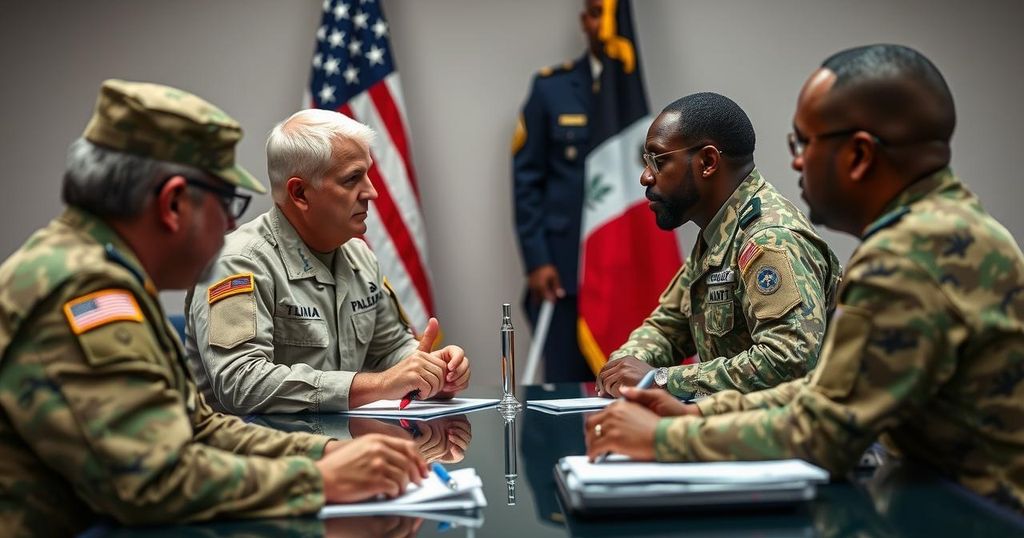Politics
ALVIN HOLSEY, BASIN SECURITY INITIATIVE TECHNICAL ASSISTANCE FIELD TEAM, BOLIVIA, CANDACE BOND, CARIBBEAN, DEFENSE, INTERNATIONAL RELATIONS, KEITH ROWLEY, MILITARY, NATIONAL SECURITY, NORTH AMERICA, PORT, PRIME, ROW, ROWLEY, SECURITY, SOFA, SOUTH AMERICA, SOUTHCOM, TRINIDAD, UNITED STATES, US, VENEZUELANALYSIS
Nia Simpson
Trinidad and Tobago and U.S. Renew Military Agreements Amid Venezuela Deployment Controversy
On December 10, 2024, the U.S. and Trinidad and Tobago renewed several military agreements, including an amended Status of Forces Agreement (SOFA) to enhance defense cooperation. Prime Minister Keith Rowley denied claims that these agreements would allow U.S. troop deployments related to Venezuela, emphasizing Trinidad’s commitment to peace and diplomacy. The controversy highlights the delicate balance of regional relationships amidst geopolitical tensions.
On December 10, 2024, the United States and Trinidad and Tobago announced the renewal of multiple military cooperation agreements, including an amended Status of Forces Agreement (SOFA) originally established in 2007. The renewed agreements aim to enhance defense collaboration between the two countries, permitting greater operational interoperability and extending arrangements such as the Caribbean Basin Security Initiative Technical Assistance Field Team. U.S. officials highlighted these agreements as critical tools for fostering deeper security ties, with the U.S. Southern Command affirming the strategic collaboration on significant issues.
However, these developments were met with controversy following claims from a local newspaper suggesting the renewed SOFA permits U.S. troop deployments in response to conflicts in Venezuela. Prime Minister Keith Rowley refuted these assertions in a press conference, calling the reports erroneous and asserting Trinidad and Tobago’s dedication to maintaining regional peace, as well as disallowing the establishment of foreign military bases on its territory.
The Prime Minister emphasized the nation’s historical role in championing diplomacy and peaceful resolutions, particularly following Venezuela’s regional conflicts, thus aiming to maintain cordial relations with both the United States and Venezuela. While Trinidad and Tobago pursues offshore natural gas projects with multinational companies, the Trinidadian government seeks to navigate U.S. sanctions against Venezuela in a manner that does not compromise diplomatic ties. The ambiguity surrounding the SOFA’s new terms, however, has led to speculations about Trinidad’s potential role in any U.S.-Venezuela military engagement.
The renewed military agreements between the United States and Trinidad and Tobago reflect ongoing geopolitical dynamics in the Caribbean, primarily influenced by the proximity to Venezuela, which has been mired in conflict and international tensions. The original Status of Forces Agreement (SOFA) established a foundation for military cooperation that has since been amended to facilitate greater operational capabilities. Amid rising concerns about U.S. military activity in the region, these developments have drawn scrutiny regarding their implications for sovereignty and regional stability. Prime Minister Rowley’s statements seek to clarify Trinidad and Tobago’s position on non-interventionist principles and its historical advocacy for diplomacy over conflict.
In summary, the renewal of military agreements between the United States and Trinidad and Tobago signals a commitment to enhanced defense cooperation, despite local concerns regarding military deployments in response to Venezuela’s conflicts. Prime Minister Rowley firmly denies any intentions to permit U.S. troops for such purposes, reiterating the country’s non-interventionist stance and dedication to maintaining diplomatic ties, particularly in the context of ongoing energy exploration efforts with Venezuela. The situation underscores the complexities inherent in regional geopolitics and the balancing act required in international relations.
Original Source: venezuelanalysis.com








Post Comment